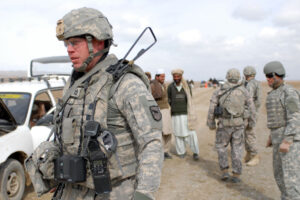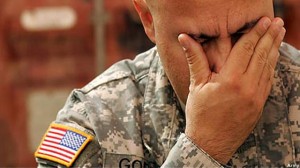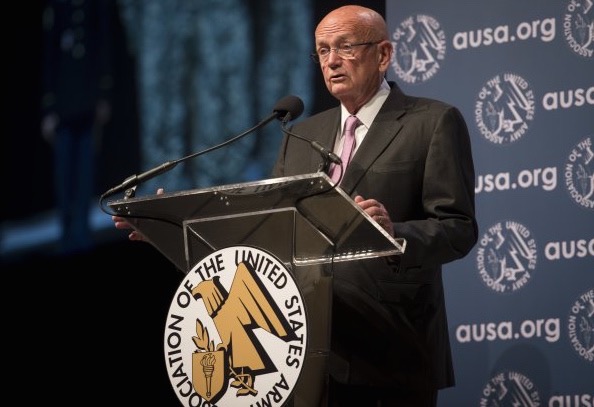AUSA: Seeking Stability (& Sanity) In 2015
Posted on
The regular Army and the National Guard are increasingly at loggerheads — not because they don’t respect each other, but because both want to protect their funding, their mission, and their people from zero-sum budget cuts. We asked the chiefs of the two leading advocacy groups involved to present their very different views for the way ahead.
In this op-ed, we hear from the president of the Association of the United States Army (AUSA) and former Chief of Army Staff, Gen. Gordon Sullivan, who calls for calm and a big-picture perspective. Click here to read the counterpart piece by Maj. Gen. Gus Hargett, head of the National Guard Association of the United States. We’ll let you judge for yourself who’s right about what. — The Editors.
The New Year begins with the Army focused on where it’s headed in 2025 and beyond, but another generational transformation of the force cannot succeed if some bubbling turmoil isn’t resolved. Without solid ground to stand on, and without teamwork between the active, reserve and civilian workforces, the Army could have trouble seeing and planning for the future.
Here are some of the things that need fixing:
 Stabilize the Budget
Stabilize the Budget
We need to drive a stake through the heart of sequestration so there is stability and certainty in the budget process. The Army already was hurt by this budget-forcing gimmick that was supposed to be so terrible to contemplate that Washington’s political class was supposed to do everything to avoid it.
It is already clear to everyone that sequestration, just by being on the books, is disruptive to defense planning. Senior Army leaders have warned it is almost impossible to make any major strategic decision when the amount of money available remains unknown and warned that sequestration in 2016 would almost guarantee that active-duty strength would drop to 420,000 soldiers. The Army Guard and Army Reserve wouldn’t be spared, with their own personnel cuts expected.
Despite these warnings, the only respite from sequestration was a deal struck by politicians to put off the issue until after the 2014 mid-term elections, with renewed promises after the November elections to work out some new budget arrangement.
Repealing sequestration needs to be a top priority. We should not have to wait for a year of debate to let the Defense Department and Army off the hook.
Time for a True Total Force Discussion

South Dakota National Guard soldiers on duty in Afghanistan.
Unhealthy and unnecessary friction in the Total Force is a consequence of the larger budget pressures facing the Army. We need to make certain the suboptimal decisions foisted on the Army’s leaders don’t damage the overall cohesiveness of what is shaping up to be a much smaller active, Guard and Reserve force.
There is a serious risk that gains in cooperation made over the last decade of war could go for naught, which would be a severe blow at a time when the Army will have less that 1 million soldiers and when capabilities of all elements of the Army must be maximized.
We will need a mature, unemotional dialogue within the Total Force, which will then enable Army leaders to articulate with one voice the needs and requirements of an Army with critical missions at home and abroad. Healing the rift between the Regular Army and Army National Guard needs to be a priority. Hurt feelings will just get in the way.
 Stop Scaring People
Stop Scaring People
Soldiers and their families are being worn down by constant discussion about cutting pay and benefits, to the point where the conversation might be more damaging than the outcome. The Commission on Military Compensation and Retirement Modernization is expected to issue its final report and recommendations in February. That seems likely to launch another round of heated debate about the pay, bonuses, retirement and health care for the active, reserve component and retiree force.
Soldiers and their families already have endured years of discussion about how rising personnel costs are hurting national security, and listened to proposals to cap pay raises, increase out-of-pocket expenses for housing and health care, and reform military retirement. The 1 percent basic pay raise received by soldiers the last two years has already caused concern.
A speedy and clear response to recommendations from the commission to indicate whether any reforms will be endorsed the Defense Department and Army leadership would go a long way toward reducing anxiety.
Every Theater is Important
The newest Army Operating Concept, called Win in a Complex World, focuses on the capabilities and forces needed on a global basis against increasingly capable and unpredictable foes. These are worldwide needs, not just based in a particular theater.
Phrases like “Pacific Pivot” and “Shift to Asia” tend to obscure the facts. First, the Army never left the Pacific and never took its eyes off of the threat of places like North Korea. Second, we should never give an appearance that one theater is more important to us than another. Instability is a global issue and the Army is a global force capable of decisive action everywhere.

A Florida National Guard soldier mourns a fallen comrade.
Avoid Permanent Harm
With ongoing budget cuts in all categories, at some point the nation needs to accept the reality that our most precious, capable, and flexible weapon system is people. Training and professional development of Army leaders at all levels might well be the secret sauce which assures success on future battlefields. Indeed, technology enables our warriors, but skilled and confident leaders will be needed to carry the day.
Gordon Sullivan, former Army Chief of Staff, is president and CEO of the Association of the U.S. Army. Sullivan retired in 1995.
Subscribe to our newsletter
Promotions, new products and sales. Directly to your inbox.

